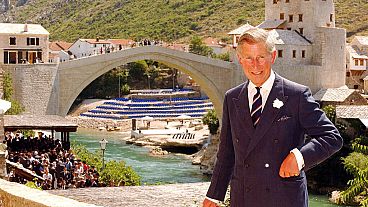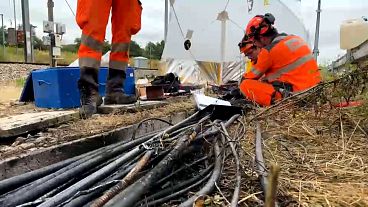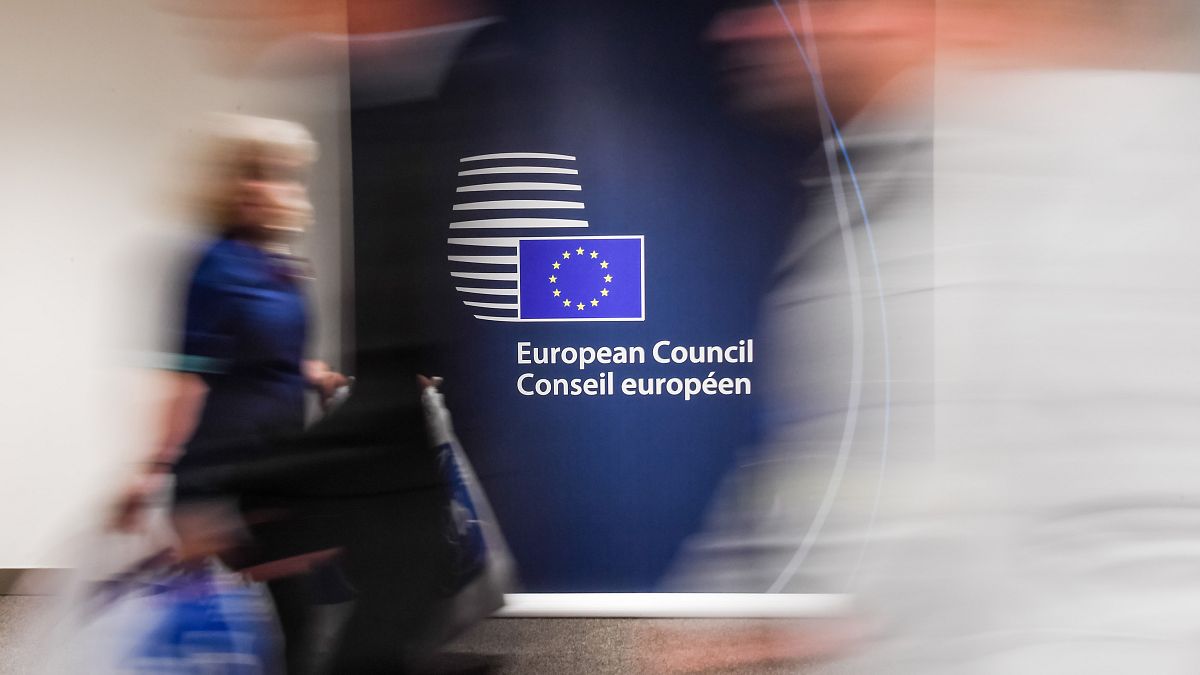The unofficial English of the EU has its supporters and its critics, but is it a 'real' language or just a result of bad learning?
Now that the UK has left the European Union - albeit with one foot in the door until 31 December - there are now no remaining member states with English as their official language.
In both Ireland and Malta, English is an official language, but both countries have selected their national tongues - Irish and Maltese - as their EU-nominated language.
But Brexit is unlikely to result in citizens of Europe shunning English. In a 2012 report by the European Commission it was found that English was the most widely-spoken foreign language in the EU, understood by 38% of respondents to a survey.
English was the mother tongue of only 13% of those that took part in the survey, in joint second place with Italian and behind German, the native language of 16% of EU citizens.
A total of two-thirds of European citizens, however, considered English the most useful language after their mother tongue, and four in five believe it is the most important for their children to learn. A 2017 survey by Eurostat found that 95% of students in the bloc were studying English as a second language.
Taking all this into consideration, figures for second languages spoken by UK citizens are unsurprisingly low, with the prevalence of speakers of their own language perhaps at least partly explaining a lack of incentive for them to learn another. In 2016, Eurostat reported that 65 per cent of Brits had no knowledge of any foreign language, the highest percentage in the EU.
But English won't be following its native speakers out the doors of EU institutions with Brexit – not only has it been confirmed that it will remain an official EU language, but there is an unofficial language, derived from English, that Brits can lay little claim to.
Indeed, this language belongs more to the EU as an entity than to any member state, current or former - it is called Euro English.
What is Euro English?
“It is a little bit of a messy use of English. It's people trying to express themselves in English but very often taking direct translations from their native languages, plus adding to that a kind of technocratic language that comes from the European institutions,” said German MEP Terry Reintke, of the Group of the Greens/European Free Alliance.
“In the meetings where we don't have interpretation, and where people people communicate in English, this is how the communication works.”
In short, Euro English is the everyday, pidgin version of the language, as spoken by the people working in the EU's institutions – an amalgam of jargon, British English, the English spoken by non-native speakers with all its inherent quirks and common mistakes, and terms borrowed from the 23 other official languages from across the bloc.
The term was coined in 1986 by German linguist Broder Carstensen, who said: “The English these people use is also a kind of Euro-English, and it is obvious that it will be rather different from the real present-day English usage that was its original model.”
Reintke agrees that it is a vernacular quite unlike the English she heard spoken while she was living in England and Scotland, prior to first arriving at the European Parliament for an internship in 2010, and said it was one that she had to get used to.
She gives some examples: “The most obvious are [words] that in real English, British English, we wouldn't use [as] a plural. The most common is 'information' – in Euro English, people take it directly from their own language and say 'informations' [in French, for example, the noun information is plural – les informations].
“One of the things that my Irish flatmate, who also works for the EU, always points out is that when somebody says, for example, 'I play football, don't I?,' in Euro English people say, 'I play football, non?'. Instead of using the terms 'isn't it, don't I, do you,' we just use the question non?, which in a lot of languages is a way of expressing that.
“The most recent [and pertinent] example was the term 'home office' which obviously in British English doesn't have the same meaning [in the UK the Home Office is a government department].
“Very recently I tweeted something using the term 'home office' and I had a lot of followers who were native English speakers who were a little bit puzzled about what I was trying to say.”
Other commonly used Euro English terms and constructions include the word “possibility” in lieu of “opportunity” – derived from the French term “la possibilité,” which means both; and usage of the possessive construction “the pen of my aunt” borrowed from Romance languages, rather than “my aunt's pen”.
Words from other languages relating to technology also often replace those a native English speaker would use: SMS rather than text, Handy rather than mobile phone (from the commonly used German term).
“What” is often replaced by “how” in the phrase “what do you call it,” as seen in European languages including Italian, French, German and Polish.
In Euro English, the word “occasional” is replaced by “punctual,” while another time-related construct that would be a non-sequitur to native English speakers is the use of “finally” where they would use “in the end”: “Finally, I decided to stay in Brussels.”
How legitimate is it?
Some academics have suggested that many of these characteristics are no more than learners' mistakes. Certainly the author of this 2016 European Court of Auditors report, entitled Misused English Words and Expressions in EU Publications – aimed at its staff, and one of the few written traces of the language that can be found in official documents, as according to an EU official Euronews spoke to “it does not officially exist” – seems to take this view.
Jeremy Gardner writes: “A number of the errors mentioned in this paper can be ascribed less to a question of meaning than to an aspect of English grammar that seems to have gone relatively unnoticed in the English teaching in European schools – the distinction between countable and uncountable (or mass) nouns... This concept is fundamental for an understanding of the errors found with words like ‘action’, ‘aid’, ‘competence’, ‘conditionality’, ‘training’, ‘screening’, ‘precision’ and ‘prefinancing’.”
These directives aside, Euro English seems to be something that exists more in reality than in theory, and in one particular reality only. One EU official who spoke to Euronews said: “It's not something that easy to grasp if you're not in the European institutions bubble.”
He continued: “I think in writing, you won't find many traces of Euro English. It's when you don't have an editor scrubbing your text that you will see it coming to life. It's more something you hear during meetings and informal conversations. I think it's just something that happens naturally when you have non-native speakers who are using a second or third language – it becomes some kind of dialect.”
“I'm a native French speaker and I hear a lot of French words used in conversation in English. Because a lot of people know French or German as a second or third language, they will use words from these languages whenever they cannot find the proper term in English. So in the middle of a conversation someone will use a French word to describe something, and most people in the room will understand it, and no one is [phased] by that.”
“It is an insider language, and here I'm mostly thinking about the jargon, the terms that we use. The first time I heard all these people saying they were going on missions, I was like, what are they doing? It sounds very glamorous, like secret agents.”
The idea of this so-called dialect as an identity marker, one that denotes the speaker as belonging to a group, is strengthened by the fact that, according to our source, it's not just non-native English speakers who use it. EU staff who have English as their mother tongue also regularly use terms and phrases that they know are not correct in British English.
He said: “Native English speakers definitely use it too. I think it would be hard to avoid because everyone's using it. I've spoken to native English speaker colleagues who have said like, oh my god, I'm also speaking like that. There are certain sayings or words that are more understandable to everyone so I think they see it that they have to make some sacrifices [of their language]. I think at some point they don't even think about it, after a while it becomes natural and you don't overthink it, it's part of daily life.”
Reintke's Irish flatmate is apparently among them. She said: “He told me that for him after a while when he came back home [to Ireland] he realised that he had picked up certain expressions or ways of saying something which Irish people don't really say.”
While Heath Rose, associate professor of applied linguistics at Oxford University and co-author of Introducing Global Englishes, agrees that Euro English could be used to “consolidate an identity,” he says that it falls short of being a dialect, and is simply another example of the flexibility of English as a language, rather than a separate dialect of it.
“Euro English is a term that's a very neat idea, that some people have gotten attached to, but I haven't seen a lot of evidence that it is a dialect in itself. In order for something to be a dialect it needs to be quite stable, it needs to have features that have been shown to be very stable.
“English as a lingua franca is very flexible – we change our language according to who we're speaking to, their language background, what language community they're from, their proficiency level, so I think at the moment the English-using community is very diverse so we can't really peg a single dialect as being representative of English used [in Europe].”
Robert McColl Millar, professor in linguistics and Scottish language at the University of Aberdeen, agrees: “I'm not so sure about Euro English. There is a tendency for a stripped down mid-Atlantic variety being used by very good non-native speakers, but I'm not convinced that this is as well developed as other non-native varieties like South Asian English.”
As, in an emerging pattern, does John Joseph, professor of applied linguistics at the University of Edinburgh. He said: “My belief is that Euro English isn't a unified language or dialect, but a catch-all term for a wide range of varieties of English used by non-native speakers on the continent, and which are occasionally reflected in documents emanating from the EU – although the EU institutions employ, and probably will continue to employ, a large contingent of native English speakers who will 'nativise' the language of such documents.”
The future of British English in Europe
In terms of Euro English's parent language, British English, and its place in the institutions (alongside its linguistic offspring), Prof McColl Millar adds: “In relation to the EU, I cannot envisage a time when English doesn't assume considerable importance. It will, I would imagine, be the preferred language in the European Parliament and in other central bodies by the Nordic, Balkan and Baltic countries at least, given that the chances of simultaneous interaction between, say, Estonian and Maltese would be pretty unlikely. Plus, English is spoken by the present superpower (the USA) and seems to be preferred by the coming one (China) as the language of external communication.”
Professor Joseph again agrees, saying that, while “one mustn't underestimate the power of ideology, and there are other forces standing in opposition to English within the EU, although the French resistance is far weaker than it was in earlier times, nevertheless, it is hard to see the use of English shifting significantly in the short term. Although it is possible that in the medium to long term this will change – presuming the EU survives in its present form, which of course is not a given.”
In terms of the choice made by Ireland to nominate Irish as its official language, he adds: “No more than 10 per cent of the population of Ireland is fluent in Irish Gaelic. Having Irish rather than English as the country's official EU language is an 'act of identity' which was of no consequence so long as the UK was in the EU. Now that it isn't, Ireland will have to make the choice between taking a pragmatic or an ideological course.”
Prof Rose too thinks that practical considerations will take precedence over ideology when it comes to the continuation of English as a working language of the EU, saying: “[If the fact that English is the most widely taught language in schools in Europe] is going to change, I don't think it's going to change quickly. I mean anything is subject to change – go back 40 years and Europe was a very different place, so 30 or 40 years in the future it could be very different again, but I think it would take quite a long time to change, just because of the investment.
“I think it's 96 per cent of pupils across the EU [that] study English as a foreign language in schools, and the next one down from that is French at 23 per cent, so at the moment there is just such a big gap between those that are studying English and those that are doing other languages in Europe, that it'll take a while for that to really change.
“Even though the EU has an initiative that encourages learning two or more foreign languages [educational and language policies are the jurisdiction of individual member states], a lot of European countries are not really following that guidance, and so a lot of students are not exposed to an additional foreign language beyond English.”
English as a neutral language
Given that there is no longer any member state in the bloc with English as its nominated language, it has effectively become a neutral means of communication, unbound by the accusations of political point-scoring that could be levelled at those who used it previously, or those who use, for example, French or German now. It could now, instead, be seen as a leveller. As our EU insider says: “I think if you're using another language it could be perceived as like, this country is trying to have greater influence. With English, this is less likely to be the case.”
For Prof Rose, over and above the fact that the UK no longer has a stake in proceedings, English has already ceased to be associated exclusively with the UK by those in Europe: “I think nowadays a lot of Europeans probably don't even think of English as necessarily belonging to the United Kingdom. They probably see English as a European lingua franca, so I think that would be very hard to change both practically and in terms of the way that it's actually used.
“There could be ideological reasons to change this but then we would get into quite political hot water in terms of what language should replace it. In many ways [the UK having left the EU] takes the political argument out of it. If English is no longer the nominated language of any of its users, then it can kind of serve a more egalitarian role.”
The future of Euro English
MEP Reintke believes that it's not just British English that could indeed flourish in the post-Brexit landscape, but that it could be fertile ground for Euro English too to come into its own, freed to an extent from the domination of its parent language.
Reintke thinks it will continue to be the lingua franca, and will only grow and evolve, with the adoption of more phrases from different European languages. She said: “I think it would be interesting to do a study about it, maybe have some linguists look at how English is being used right now and then maybe look in 10, 20 years, and see how things have changed.”
So it would seem its native language could be the UK's most tangible legacy, its most potent parting gift to the EU, in whatever form. Reintke for one is a grateful recipient, saying: “I'm a very big fan of British English, I find it really beautiful, and people would not necessarily say that about Euro English.
"It's not really beautiful, not in the most obvious sense, but if you look at it in a deeper sense... I mean, we have fought against each other, there have been wars on this continent, and now we come together in the parliament, and at least we are trying to communicate."












